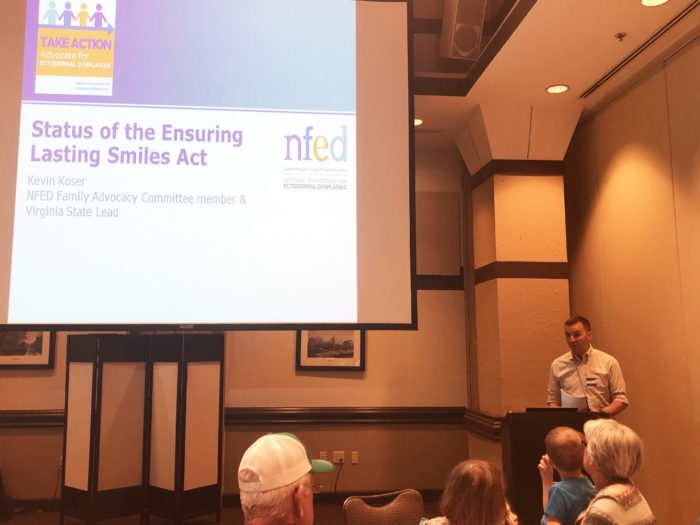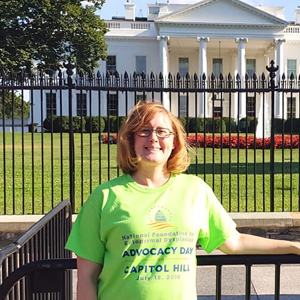By Beth Orchard
Why anyone can make a difference by sharing their story
Advocacy is the backbone of why the National Foundation for Ectodermal Dysplasias (NFED) has fought for their families on both a statewide and national stage. The foundation supports families, educates, and trains them to advocate.
People can limit themselves by thinking it’s not something they can do. If you are affected by any congenital anomaly, there is a place for your gifts to be used in our advocacy.
The advocacy process seems mysterious, but it is straight forward. It starts with knowing your story, sharing it, and owning that story as part of a larger family committed to change.
At a national level, the NFED is challenging the status quo on Capitol Hill. In your backyard, we are putting families front and center of the debate around insurance coverage for congenital anomalies. Let us tell you why advocacy is not as mystifying as it sounds.
Rumor: My Story Is Not Unique
Truth: Your story may not feel unique because you live it every day. Each day you wake up in your own skin, look in the mirror, and get ready for the day, you are living your story. Even with all the challenges you face with ectodermal dysplasias or a different congenital anomaly, you might not feel your story has power.
The truth is, there is nothing more powerful than one person’s story to transform many lives. Hundreds of advocates across the United States have joined the NFED for Day on the Hill, in legislative offices, phoned in, written legislators, and gone to local meetings to share their stories. Each story has the power to make an impact on their district’s legislators.
When they take those to Capitol Hill, those combined stories have helped to create a bill, the Ensuring Lasting Smiles Act (ELSA) that is making a dream of seeing a federal mandate for insurance coverage of congenital anomalies a reality.
Rumor: I Can’t Travel
Truth: Travel is not required for advocates. Many advocates live a distance away from Capitol Hill, but only steps away from their legislator’s doorsteps. Legislators love to hear from constituents by letter, email, fax, and phone as to why their story matters to make change. People who can attend local meetings do and those who can’t have many other options to create change just where they are.
Rumor: I Don’t Know the Laws

Truth: A legal degree is not required to advocate for yourself or others. Some of the most prolific and meaningful changes have come from people who had little to no education in the law. The NFED has put together some advocacy resources to build your skills. We offer free trainings, webinars, a social media group, and personal connection to advocacy State Leads to help you advocate for yourself and your family.
Rumor: I Don’t Have Time
Truth: Time is not the most important factor in advocacy. People can devote as little or as much time as they want and are able to give for advocacy work. The NFED encourages people to connect with their state leads and ask how they can share their story.
Learn how to be part of the change happening on Capitol Hill right now. All it takes is a few moments to put together your story of how you and your family are affected by ectodermal dysplasia or other congenital anomaly. If you are willing to let them carry it forward, they can share it with legislators and keep you informed of updates.
There are many reasons to be wary of giving your time and energy to a cause. Everyone is out there seeking your time, energy, and even money for one cause or another.
The NFED is here to advocate for, but most importantly, with you.
We cannot do this without your unique voice and story. You can be part of the reason why many other people affected with congenital anomalies are able to get what they need.
All because one person shared their story. Be a part of making a difference and join our fight for insurance coverage today.
If you have any questions about advocacy, contact Becky Abbott on the NFED staff.
Ask Your Legislators to Co-Sponsor ELSABeth Orchard is a guest blogger for the National Foundation for Ectodermal Dysplasias and a member of the NFED Family-Driven Advocacy Committee. She lives near Chicago with her husband and two children. She and her son are both affected by hypohidrotic ectodermal dysplasia.
